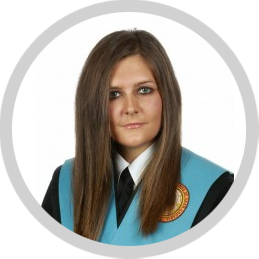
Sunčica Žiljak completed the study of written and oral translation (for Spanish, French and English), and from 2007 to 2013 she lived and worked in Spain, in the Canary Islands, the city of Las Palmas de Gran Canaria. In addition to studying and translating, she was also working as a language teacher and a dancer.
In her Spare time Sunčica enjoys reading Latin American literature, especially Isabel Allende and Mario Vargas Llosa.
Why did you return to Croatia? One of the main reason for my return was "saudade", but also an insatiable desire to try to work in my mother tongue, because in Spain none of the language combinations available at the faculty and in my professional life involved Croatian. Sunčica has many plans, but most of them revolve around simultaneous interpretation; some of her short-term goals include interpreting, the popular Bruxelles and the French speaking area.
We decided to introduce Sunčica as one of the favorite contractors working for Studio Nixa.
1. Translation: a calling or an occupation?
Definitely a calling. I have always known that I wanted to do something involving languages, although in the very beginning, after I finished a language program gymnasium, I was not sure which path I was going to take. One of my options was of course the Faculty of Humanities and Social Sciences in Zagreb, but it hadn't really intrigued me because I never saw myself being a foreign language professor. I considered teaching foreign languages only as a hobby. My trip to Spain was, without a doubt, one of the best decisions I've ever made, because it provided me with the opportunity to study written and oral translation, a combination which unfortunately still does not exist in Croatia.
2. A literary or a commercial translation?
Definitely a commercial translation. I believe that a person doing literary translations should be a translator and a writer at the same time. Nevertheless, the idea of translating literary works is not that foreign to me. However, what hinders me is the responsibility that comes with that task and the fear that I will not be able to reproduce the personal style and language of a certain author. In any case, if I decided to do literary translations, I would try to specialize exclusively in that area.
3. Would you rather translate 100 documents containing one custom page or one document containing 100 custom pages?
I would rather translate one document containing 100 custom pages. It is really incredible how many diverse topics a translators can come by. I personally think that one translator will never be able to handle the topics from all fields. That is why a single document containing more text provides certain advantages in terms of the fact that a translator gets familiarized with the topic of the text and the terminology.
4. What is your favorite translation in general and the favorite translation you did for Studio Nixa?
I have always bee interested in the topic of tourism. I am still fascinated at how rich our languages are and that power of a language is especially visible in tourism-themed texts, which are a tool by which the author, and the translator, seduce their readers. I remember vividly the translation of Disney's Animal Kingdom from English into Spanish that I did in my student years. With regards to Studio Nixa, I would single out the translation of the text „Conquista el Adriático“.
5. Written translation or interpreting?
Interpreting, without a doubt, because it is more dynamic. Spending hours and weeks translating in front of a computer screen can be really exhausting.
6. Simultaneous interpretation: the partner in the booth - always the same person or a different person each time?
I believe that always working with the same person gives you a certain amount of security. Nevertheless, I think that sometimes it pays off to "take a risk" and to work with other interpreters because we can always learn something from our colleagues.
7. Written translation: With or without CAT?
I personally love CAT tools because despite them being flawed programs, they are really helpful. Of course, it is necessary for a translator to always have a complete text of the original as reference, when working with a CAT tool.
8. Working from home or at the office?
I think I prefer the office. Translation requires a high degree of concentration, which is more easily accomplished at home. However, daily contact with our colleagues who are experts is also important because we can mutually understand each other, provide support and help each other when faced with "an impossible" translation.
9. A freelance or a permanently employed translator?
Since I want to specialize in interpretation, I think that being a freelance is the best option for me. Firstly, because being a freelance enables you to have flexible working hours. Secondly, by cooperating and coming into contact with several agencies, employees and clients the translator can discover new things and gain vast knowledge and experience.